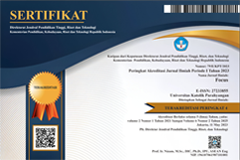Menghadapi Keragaman di Indonesia Melalui Konsep Masyarakat Interkultural
DOI:
https://doi.org/10.26593/focus.v4i1.6700Keywords:
Multiculturalism, Interculturalism, Plural SocietyAbstract
Artikel ini mengkaji tentang gagasan interkulturalisme dan urgensinya dalam masyarakat plural seperti Indonesia. Keragaman budaya, suku, dan agama di Indonesia yang telah memunculkan konflik horizontal di masa lalu. Metode yang diguanakan untuk penulisan artikel ini ialah kualitatif melalui pengumpulan data kajian literatur. Artikel ini berargumen bahwa gagasan masyarakat interkultural merupakan solusi atas problematika kehidupan modern yang mengutamakan relasi subjek-objek yang identik pada masyarakat Eropa. Dalam konteks Indonesia, gagasan masyarakat interkultural juga sangat relevan diterapkan di tengah keragaman tadi. Harapannya, melalui konsep ini, Indonesia terhindar dari ragam konflik dan ancaman disintegrasi.
References
Abdallah‐Pretceille, M. (2006). Interculturalism as a paradigm for thinking about diversity. Intercultural Education, 17(5), 475–483.
Adorno, T. W. (1973). Negative dialectics (Vol. 1). A&C Black.
Avineri, S. (1974). Hegel’s theory of the modern state. Cambridge University Press.
Bekemans, L. (2008). Intercultural dialogue, democracy & active citizenship in Europe. Undertaking Intercultural Exchange: Joint and Innovative Actionsfor Participatory Integration.
Bennett, M. (2013). Basic concepts of intercultural communication: Paradigms, principles, and practices. Hachette UK.
Cantle, T. (2012). Interculturalism: The new era of cohesion and diversity. Springer.
Cantle, T. (2014). National identity, plurality and interculturalism. The Political Quarterly, 85(3), 312–319.
Chen, G.-M. (1997). A review of the concept of intercultural sensitivity. ERIC.
Deleuze, G. (2006). Nietzsche and philosophy. Columbia University Press.
Deleuze, G., & Guattari, F. (1988). A thousand plateaus: Capitalism and schizophrenia. Bloomsbury Publishing.
Foucault, M. (1994). Michel Foucault (Vol. 2). Taylor & Francis.
Hardt, M., & Negri, A. (2004). Multitude: War and democracy in the age of empire. Penguin.
Intan, B. F., & Bangun, C. (2022). Principled Pluralism and the Prevention of Religious Terrorism in Indonesia. Religions, 13(5), 429.
Johnson, P. (2006). Habermas: Rescuing the public sphere. Routledge.
Liliweri, A. (2015). Teori-Teori Komunikasi Antarbudaya. Yogyakarta: Pelangi Aksara.
Maalouf, A. (2001). In the name of identity: Violence and the need to belong. Arcade Publishing.
Nussbaum, M. (2007). Human rights and human capabilities. In Harv. Hum. Rts. J. (Vol. 20). HeinOnline.
Sen, A. (2006). Identity and Violence: Thellussion of Destiny. New York: Norton in Company.
Sen, A. K. (1997). Human capital and human capability. World Development, 25(12), 1959–1961.
Soekanto, S. (2017). Sosiologi Puatu Pengantar (1st ed.). Jakarta: PT PT Raja Grafindo Persada.
Viktorahadi, R. F. B. (2022). Etika Al-Ghazālian dan Titik Temunya dengan Etika Kantian. Focus, 3(1), 43–52.
Wakano, A. (2020). Reproduction of multiculturalism in the development of information and communication technology at islamic higher education institutions in indonesia. International Journal of Advanced Science and Technology, 29(7), 681–695. Retrieved from https://api.elsevier.com/content/abstract/scopus_id/85084699106
Weber, M. (1992). The Protestant ethic and the" spirit" of capitalism and other writings. London and New York: Routledge.
Wilson, H. F. (2014). The possibilities of tolerance: Intercultural dialogue in a multicultural Europe. Environment and Planning D: Society and Space, 32(5), 852–868.
Zapata-Barrero, R. (2015). Interculturalism: Main hypothesis, theories and strands. In Interculturalism in cities (pp. 3–19). Edward Elgar Publishing.

Downloads
Published
Issue
Section
License
Copyright (c) 2023 Stephanus Djunatan

This work is licensed under a Creative Commons Attribution-ShareAlike 4.0 International License.



















